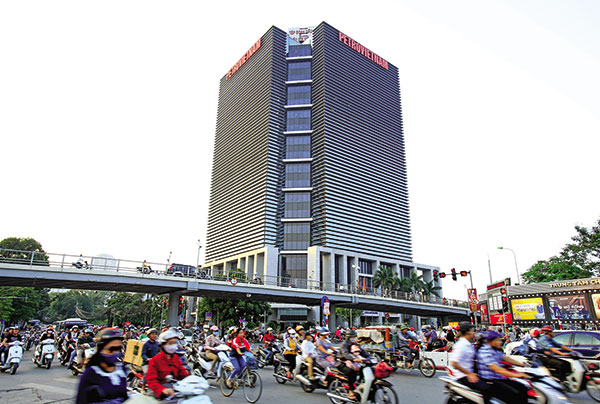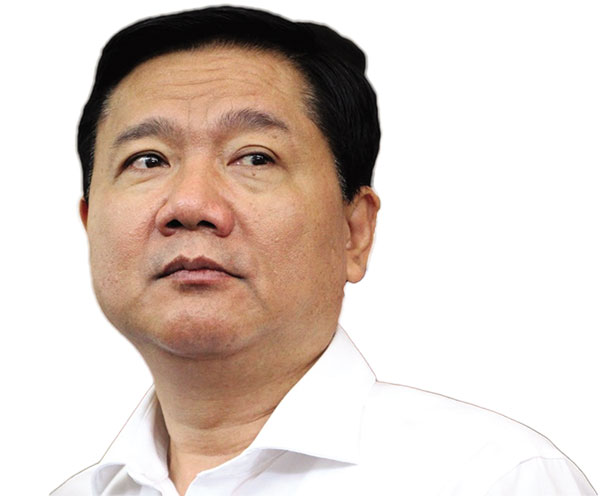PVN kingpin faces strict punishment
 |
| Dinh La Thang stewarded PetroVietnam as the firm funnelled millions into OceanBank_ Photo: Ngoc Thang |
The Ministry of Public Security’s Investigation Agency last week completed its investigation conclusions into the “intentional violation of state regulations on economic management with serious consequences, and asset embezzlement” at state-run Vietnam National Oil and Gas Group (PVN) and its subsidiary PetroVietnam Construction JSC (PVC).
The agency proposed that the Supreme People’s Procuracy prosecuted 22 people involved.
 |
| Dinh La Thang |
The agency has proposed that Dinh La Thang, held in custody for investigations since December 8, and 11 other arrestees be charged with “intentionally violating the state regulations on economic management and causing serious consequences”, while eight others may face a charge of “asset embezzlement”. Two people – Trinh Xuan Thanh and Vu Duc Thuan – are to be charged with both of these violations.
Thang is a former Politburo member (January 2016-May 2017), former vice head of the Central Economic Committee (May-early December 2017), former Minister of Transport (2011-2016), former National Assembly member (10 years), and former Party Secretary of Ho Chi Minh City’s Party Committee (February 2016-May 2017). He is also the former Secretary of the Party Committee and former chairman of PVN (2005-2011).
Meanwhile, Thanh is PVC’s former chairman, and Thuan is former member of PVC’s board of directors, and the firm’s former general director.
According to the Investigation Agency, Thang, together with many other PVN executives, caused a VND800 billion ($36.4 million) loss to the state budget by contributing capital to OceanBank, violating state regulations on economic management at PVC, and engaging in irregular behaviour relating to the Thai Binh 2 Thermal Power Plant.
Taking a loss at OceanBank
According to the Party Central Committee’s Inspection Committee, Thang, 56, has to “bear the prime responsibility for the violations and shortcomings of the PVN Party Committee’s Standing Board and member council in the 2009-2011 period”.
A further six people are also involved in this case, including Nguyen Xuan Son (OceanBank’s former vice general director), Ninh Van Quynh (PVN’s former vice general director), Nguyen Xuan Thang (former member of PVN’s member council), Nguyen Thanh Liem (former council member), Vu Khanh Truong (former council member), and Phan Dinh Duc (former council member).
Thang was found to violate the working regulations of PVN’s board of directors by clinching a deal in 2008 contributing 20 per cent [worth VND800 billion or $36.4 million] of the capital to privately-owned OceanBank prior to the deal being approved by PVN’s board of directors.
The investment flouted regulations, and caused “very serious losses to PVN”. The State Bank of Vietnam acquired the debt-ridden bank for VND0 two years ago, resulting in PVN’s loss.
Thang was also responsible for PVN’s member council’s issuance of resolutions and decisions on the authorisation of large bidding packages, which violated the government’s relevant decrees, and on the designation of many bidding packages that failed to meet legal regulations.
Violations at PVC and the Thai Binh 2 Thermal Power Plant
Investigators found that, in order to develop PVC into a big firm, in December 2007, Thang appointed Trinh Xuan Thanh, then general director of state-owned Song Hong Corporation, to the position of general director of PVC, though Thanh was inexperienced at the time. Later Thanh became PVC chairman.
In June 2010, without appraising PVC’s capacity and experience, and without conducting necessary procedures for contractor selection, Thang signed a PVN resolution assigning PVC to implement an engineering, procurement, and construction (EPC) contract for the $1.7 billion Thai Binh 2 Thermal Power Plant, under the format of a bidding appointment.
Thang also ordered some individuals and units to ink a financial contract between PVN and PVC. Then he required PVN to pay advances to PVC more than $6.3 million and VND1.3 trillion ($59 million) to implement the contract.
Thanh was found to have ordered the use of over VND1.1 trillion ($50 million) of this money for other purposes unrelated to the plant. This caused a loss of over VND119 billion ($5.4 million) to the state budget.
Besides, Thanh, Vu Duc Thuan, and other PVC leadership members asked PVC’s subsidiaries to use funds from PVC’s coffers for other purposes without any legal invoices.
The Investigation Agency also proposed that Phung Dinh Thuc, general director of PVN during 2010-2011, and chairman of PVN’s member council during September 2011-June 2014, be prosecuted for his allegedly having “intentionally broken the state regulations on economic management and caused serious consequences” to the Thai Binh 2 Thermal Power Plant.
Five years after commencing construction in 2012, the power plant project, expected to annually add 6.7 billion kilowatt-hours of electricity to the national power grid, is only 79.4 per cent complete, due to limited capital and slow construction.
Investigators found that Thang must be held accountable for violations of the Law on Bidding relating to a PetroVietnam Technical Services Corporation EPC contract for Dung Quat Biofuel Plant. They also found that Thang must take responsibility for low investment efficiency in some state-funded projects, including bio-fuel projects, and the Dinh Vu Polyester Fibre Plant in the northern city of Haiphong.
Beginning its commercial operation in May 2014, initially the project was invested by PVN and state-run garment and textile maker Vinatex. However, Vinatex’s VND200 billion ($9 million) contribution to the plant was withdrawn in 2015. After some restructuring, the plant’s stakeholders included PVN (75 per cent) and PetroVietnam Fertilizer and Chemicals Corporation (25 per cent).
But after becoming operational, the plant failed to adequately market its products, suffering a loss of tens of millions of dollars.
| RELATED CONTENTS: | |
| Dinh La Thang arrested and facing legal proceedings | |
| Deposed Politburo member now Party Central Committee advisor | |
| Major communist party official charged with SOE mismanagement | |
What the stars mean:
★ Poor ★ ★ Promising ★★★ Good ★★★★ Very good ★★★★★ Exceptional
Latest News
More News
- State corporations poised to drive 2026 growth (February 03, 2026 | 13:58)
- Why high-tech talent will define Vietnam’s growth (February 02, 2026 | 10:47)
- FMCG resilience amid varying storms (February 02, 2026 | 10:00)
- Customs reforms strengthen business confidence, support trade growth (February 01, 2026 | 08:20)
- Vietnam and US to launch sixth trade negotiation round (January 30, 2026 | 15:19)
- Digital publishing emerges as key growth driver in Vietnam (January 30, 2026 | 10:59)
- EVN signs key contract for Tri An hydropower expansion (January 30, 2026 | 10:57)
- Vietnam to lead trade growth in ASEAN (January 29, 2026 | 15:08)
- Carlsberg Vietnam delivers Lunar New Year support in central region (January 28, 2026 | 17:19)
- TikTok penalised $35,000 in Vietnam for consumer protection violations (January 28, 2026 | 17:15)
















 Mobile Version
Mobile Version